

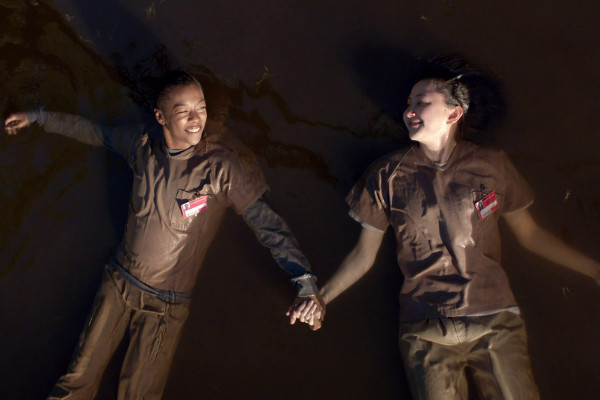
Trust No Bitch is the only season finale not to appear in a top five on this site (and only one of two not to appear in a season's top three). It's not that it's bad, more just underwhelming, the feature-length 86 minute runtime undeserved. As discussed in Mother's Day, the series rarely goes for all-out sentiment, and a slo-mo river dip for the inmates does seem far too corny for a series as edgy as this one.
This is also the debut episode of fictitious TV chef Judy King as a prisoner. Seen throughout the series on TV screens, she's brilliantly brought to life by Blair Brown, but, even as a satirical amalgamation of Martha Stewart and Paula Deen it undermines the credibility of the series by having made-up "TV stars" part of the prison roster. (It's also an addition that perhaps doesn't play so well outside of the US, where real-life controversies surrounding both Stewart and Deen are lampooned, but may not be known to an international audience).
Trust No Bitch was written by Jenji Kohan and Jim Danger Gray. Gray and director Phil Abraham do a commentary track for the episode, with both falling into the habit of watching rather than talking, but there are some worthwhile elements of note. Discussion includes how the overlong, bloated ending was written and recorded way ahead of the rest of the episode due to scheduling, as well as Gray describing the writing process for him as like writing "fan fiction". There's also talk about a shower scene that was shot over two different sets, the silly "Norma toast" being Lauren Morelli's suggestion in the writer's room and the revelation that Norma has a spider on her head in one of the later scenes...
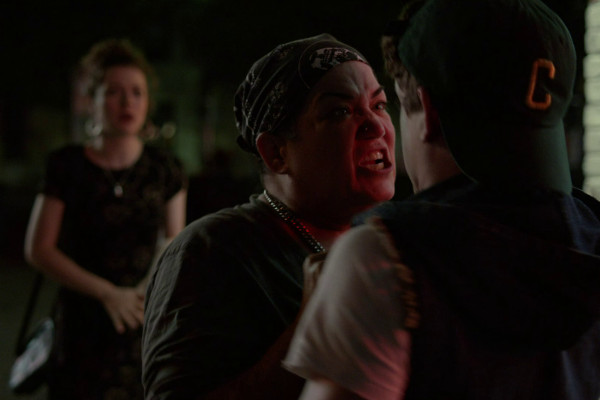
"I wish I had some sob story that would explain everything. Well sorry to disappoint you, sugar... ain't no dramatic origin story here. Just a big old dyke who refuses to apologise for it."
Despite her claims otherwise, Big Boo's backstory does come with some tragic mother resentment issues and rejection by her family, and once more makes a sympathetic character out of Boo. The only downside to a good episode is possibly the worst continuity in a series blighted by continuity issues - the scene where Boo shouts at a homophobic teen in the street is appallingly dubbed, and features some rear shots where her mouth clearly isn't even moving. These jarring continuity errors have been pointed out in other season reviews, and it remains a mystery how a series with a budget of around $50 million a season is able to consistently throw up so many shockingly careless continuity clashes.
Elsewhere, Healy turns his creepy fixations onto Red, and the character of Judy King is introduced. If there's a story arc of any description during season three - other than the unforgivably silly "cult of Norma" - it's the prison being taken over by a private company. That begins here, as part of Caputo's desperate attempts to stop Litchfield being closed.
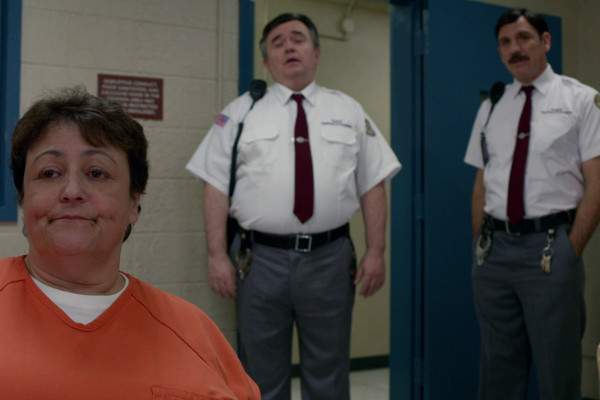
The full transition of Joe Caputo from officious sleaze to revered sainthood gets fully cemented here, with an episode that repeatedly tells the viewers what a good guy he is. Featuring a variety of unconvincing wigs, it takes us through Joe's self-imposed miserable life, with the final insight from his ex-girlfriend: "You can't spend your whole life holding the door open for people and then being angry when they don't thank you. Nobody asked you to hold the fucking door."
It's one of just many times characters indulge in what becomes more tell than show, with the revelation that Fig is having a hostile sexual relationship with him that sees her psychoanalysing him. Despite the fact that this is heavily laboured stuff, it works, largely due to charm of Nick Sandow, even when under the unlikeliest of wigs. The episode also contains a rare, oddly underused plus for a flashback story: having a peripheral character seen through a different perspective of time. Joe's first day in prison has him meet a younger, pre-cancer Rosa, unaware of the tragedy that lies in her future...
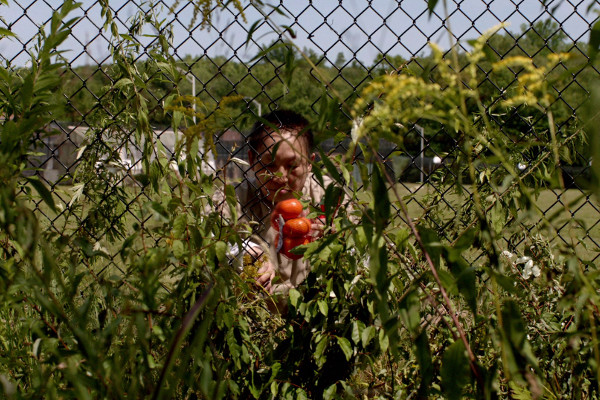
The use of flashbacks in television is now so common that it's easy to forget that it's only a relatively recent phenomenon. Arguably the first series to popularise it was Lost, and it certainly added much to the early episodes of Orange is the New Black, whereby a character's time in prison could be linked back to their earlier years.
Although the flashbacks contained some of OITNB's finest moments, by this stage in the series they were starting to become redundant. Although Chang (Lori Tan Chinn) is one of the show's funniest and quirkiest characters, she's very much minor comic relief, and it's questionable as to whether she needs a backstory, particularly when other, more prominent characters had still yet to have their stories told.
Chang had appeared in a dozen episodes before this instalment, dating back to the second, and the character is adorable, yet largely relegated to one-liners. While this doesn't make the episode the story of how Jack got his tattoo, it does raise the question of how necessary they are now the series has developed. The following three seasons saw the concept dropped entirely for four episodes each.
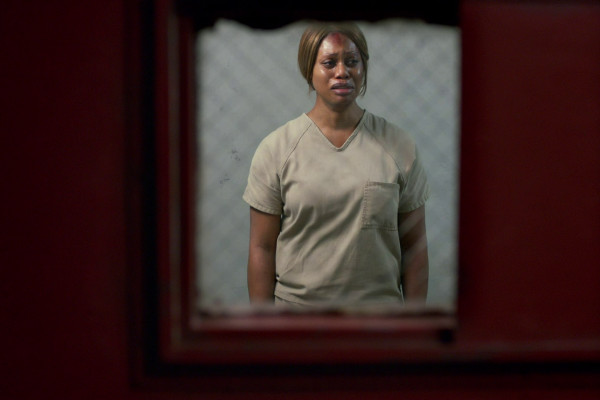
At this stage in the season the programme is able to juggle multiple plotlines with ease. A fairly bleak episode featuring Daya having the baby she'll have taken away from her, Brooke's suicide attempt, and the aftermaths of Pennsatucky's rape and Sophia's prison beating. However, there's funny lines and concepts, not least Black Cindy's belief that the New Testament is "fan fiction". Suzanne's erotic SF is a little more "meta" than most of the plots the series does, but the pay off perhaps makes it worthwhile, something that can't be said for the Norma Cult.
The flashback story goes to Aleida Diaz (Elizabeth Rodriguez), set when Daya was a small child. Rodriguez is successfully able to capture herself as a much younger woman, which shouldn't be hard: in real life the actress is just two years older than Dascha Polanco who plays her onscreen daughter. Lastly, there's an amusing take on Daya's attractive yet unorthdox looks from Pennsatucky: "the one who looks like a goldfish."
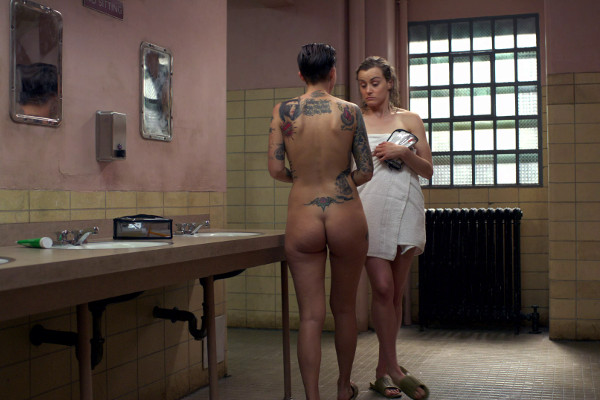
Playwright Jordan Harrison was a story editor and staff writer throughout the season, and Where My Dreidel At was his first script for the show. He wrote three more during the next two seasons, and, like those episodes, this is generally light-weight fluff.
Of course, specifying a "writer" for each episode neglects the fact that the series is crafted in the writers' room, and this season, perhaps more than any other, is dictated to by its ongoing story arcs. Now, granted, those arcs are the silliest and most lightweight things the series ever balanced a year's worth of episodes on, but Harrison's hands were tied with this one, where he had to continue the story of "Admiral RockCocker" and the beyond-a-joke antics of Norma worship.
The most talked-about moment in the episode is, of course, Stella (Ruby Rose) flirting with Piper in one of the series' exploitative nude scenes. Stella is so comfortable in her own skin that it's striking, but it's somewhat troubling that so many relationships in OITNB are started as a result of a perspective partner seeing the other naked. It suggests that the series sees sexual attraction as a direct route to love, a somewhat shorthand method of crafting an onscreen relationship.
Despite the silliness, and an enlightening but unnecessary Leanne flashback story, there is drama inherent in the later stages of the episode... Piper's pants empire may be just fluff, but Lolly and the missing pane of glass adds real terror to Alex's day...
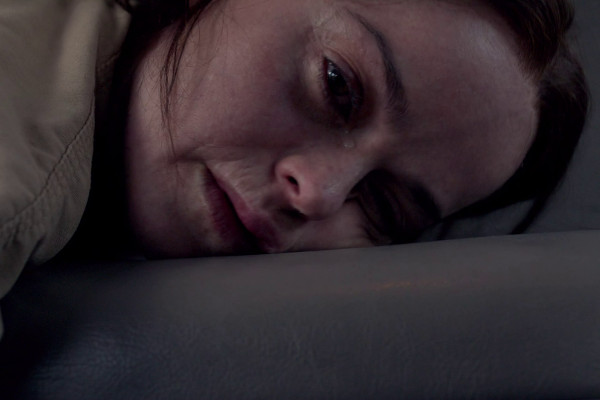
Easily the best season three episode as, in amongst all the silliness, including a suitably OTT Pornstache cameo, is genuine drama. Pennsatucky gets a flashback that, for the first time in half a dozen episodes, is not only fully developed, but actually dovetails into the present day story. Whereas once this was de rigeur, by season three it's almost a novelty.
The content of the episode is among the most disturbing the show has presented... while it's unlikely Coates would rape Doggett where anyone could discover him, it's just one of two rapes that Pennsatucky endures during the episode. There's also two bathroom assaults, and the dissolving of Piper and Alex's relationship.
Co-producer/writer Lauren Morelli and co-executive producer Tara Herrman recorded a commentary track for the DVD release, where they discussed the problematic issues behind the episode, and the discomfort felt by actor James McMenamin (Coates) when he realised his character had taken a dark turn. The relationship between Pennsatucky and Coates is a source of much contention with many, and is very questionable.
However, it's also an exploration of how some women are from a society that tells them being exploited is a life expectation, and says more about the mistreatment of women in modern society than it does represent a relationship the viewers are expected to get behind. It says a lot about the tonal inconsistencies of the series that it can present such a layered and complicated relationship between two characters, yet at the same time have Caputo and Fig have a relationship after he'd tricked her into going down on him.
On a lighter note, the commentary also points out which lines were written by creator Jenji Kohan on the final drafts of the script, along with the lines Taryn Manning (Pennsatucky) improvised, and what additions the director made. There's also the trivia that Ruby Rose has a Tank Girl tattoo, which was hidden during the series as not only would the copyright clearance rights take a long time to negotiate, but it would potentially distract viewers as Lorri Petty (brilliant as Lolly) had played the cartoon character in a 1995 movie.
Pennsatucky wasn't supposed to show emotion at the end of the episode; the tear was Taryn Manning's unconscious improvisation.